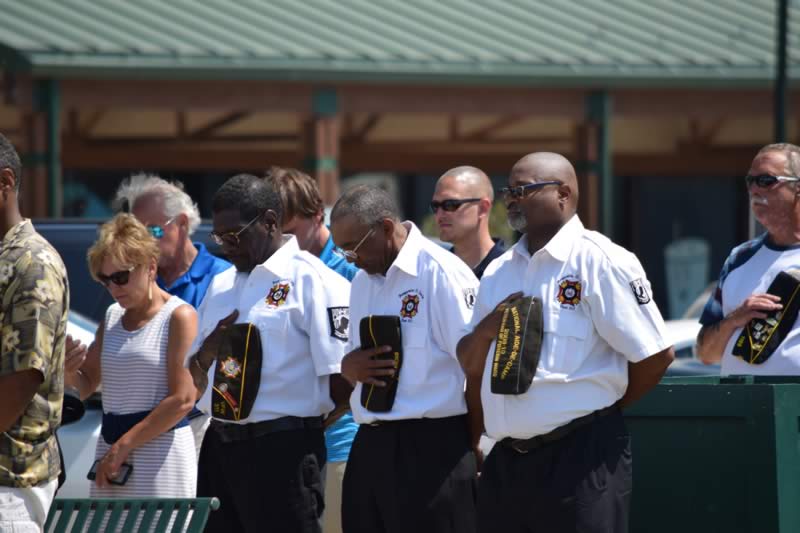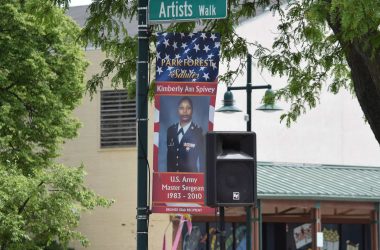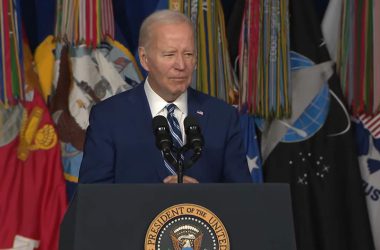HAWAII—(ENEWSPF)—April 3, 2014.
SECRETARY OF DEFENSE CHUCK HAGEL: Thank you, good morning.
The 10 ASEAN defense ministers and I just completed what I believe is an extremely valuable meeting here in Hawaii, one that affirmed the deepening bonds of friendship between our nations, and the growing opportunities that exist for us to partner together — continue to partner together to meet new and enduring security challenges across the Asia-Pacific region.
This gathering was an important milestone in America’s growing engagement with the ASEAN nations, and another signal of the important role ASEAN has to play in promoting regional stability and prosperity.
I’m grateful to all the ministers for making the trip. It was not easy. They all have many responsibilities. So I appreciate their time — and for their investment of their efforts and energy to make this happen.
I also appreciate the hospitality that’s been shown to all of us here by the people of Hawaii, the people of Pacific Command, in particular, Admiral Locklear and his men and women who have done so much, not only to assist us in putting this forum together, but what they do for the United States every day in this region of the world.
While this meeting was hosted by the Defense Department, we greatly benefited from the participation of our partners across the U.S. government, particularly yesterday’s session on humanitarian assistance and disaster relief operations hosted by the NOAA administrator, Dr. Kathryn Sullivan, and moderated by the director of USAID, Dr. Rajiv Shah.
Coming only hours after a Tsunami warning was lifted for Hawaii, the NOAA presentation and roundtable underscored that natural disasters and humanitarian crises will be defining security challenges of the 21st century, not only for Southeast Asia, but for the world.
We can expect that the frequency and the complexity of disaster relief and humanitarian assistance missions will increase. These missions demand cooperation between nations across their government agencies, NGOs and the private sector.
The discussions we had yesterday, which focused on lessons learned from recent operations, will help identify new proposals to improve our preparedness and cooperation in the future. As one example, in our discussions yesterday, Singapore proposed using Changi Naval Base as a regional humanitarian assistance disaster relief crisis coordination center. This could be an important venue for nations in the region to coordinate military responses to disasters, and it’s an idea that we’re going to pursue. This was among many ideas that came out of our last couple of days of discussions.
Today’s discussion addressed a range of other regional security matters, including improving maritime security cooperation and addressing tensions in the South China Sea.
I told the ministers that the United States is increasingly concerned about the instability arising from the territorial disputes in the South China Sea. The rights of all nations must be respected. It’s important that all claimants avoid the use or threat of force or intimidation, or coercion.
We urge all claimants in these disputes to clarify their claims, including their basis in international law, and to use internationally-accepted rules and standards of behavior.
As many of you know, tomorrow I will depart for Japan, China and Mongolia, representing my fourth trip to this region. This trip and the ASEAN-U.S. Forum shows America’s rebalanced Asia-Pacific remains a critical part of our national security strategy.
We are committed to the security and the prosperity of the region because of our interests, and also our close relationships and alliances and commitments.
America has a long-standing engagement and commitment with the Asia-Pacific region. It’s a commitment that we will continue to meet in the 21st century.
Finally, I know that we are all following events at Fort Hood, Texas. I’ve been staying in touch with Army leaders and our senior DOD leaders, and will continue to do so.
We need to let investigators do their work, and help us all understand exactly how this happened.
As you all know, the department is in the process of implementing recommendations of the views that followed the Navy Yard shooting last year. As the Fort Hood investigation unfolds, we will continue to take a close look to identify any new lessons learned, and implement those, as well. In the meantime, we will all stay focused on the victims and their families and the Fort Hood community, who, yet again are experiencing a terrible tragedy and much grief.
Thank you.
MODERATOR: I think we’ve got time for some questions. I’m going to give this mike over here, and so, please wait for — to get the microphone before you ask your question.
Q: Thank you, Mr. Secretary. I wanted to ask you a little bit more about Fort Hood, if I could.
As you know, in 2010, Secretary Gates called for dozens of changes in Defense policy to deal with the insider threat from the first attack. And two weeks ago, you issued your own report, which found that many of those recommendations hadn’t been implemented. Since that time, there have been two shootings on military facilities that have exposed even new gaps in security procedures. And I’m wondering, why does it take four years and four reports to address these security problems? And isn’t that unacceptable? Why should people believe that what you’re saying now means that the Pentagon is going to take this challenge seriously?
SEC. HAGEL: Well, first, let me assure our country, the people who serve in our armed forces and their families, we do take this seriously. There’s nothing that we take more seriously than the safety of the people who work for our department.
We recognize the imperfections. We recognize the risks, everyday risks in the jobs that these men and women do for our country. But there is no mistaking the fact that the prioritization among our service leaders, our commanders, our leaders is the safety of those men and women.
Now, obviously something went wrong. We have made recommendations based on those reviews and we have implemented those recommendations in almost every case going back to 2009, and as you noted, 2010. We will continue to make the adjustments and implement those recommendations.
Obviously, we have a gap. Anytime we lose an individual, something has gone wrong. But I also noted, and I think it’s important here that we all keep in mind, let the investigators do their work. We don’t know what all the facts are. We know a lot of things 24 hours later, but we don’t know everything. What happened? What motivated this person to do this? Where was the gap? Why did we have a gap? Why did it happen?
So, let me stop there because I think we are going to find out and we will do everything possible to implement the kinds of reforms and fill those gaps and assure the security of the men and women who work for our armed forces, and assure their families.
Q: Thank you for your hospitality this week, by the way, Mr. Secretary.
Closer ties with ASEAN, rebalancing to Asia — some have suspicions that this is all a policy to contain China. How would you respond to that? And what will you be saying to the Chinese when you visit them after your trip to Japan?
SEC. HAGEL: Well, this visit was not a visit to contain China. I have said that in my three previous trips to the Asia-Pacific. The rebalance to Asia-Pacific was not a contain China strategy. President Obama has made that point very clear. Secretary Kerry has. I have.
As I said in some of my remarks here, this was a continuation of the relationships, the friendships, the partnerships that we’ve had for many years with many of these countries in Asia-Pacific. The United States has been a Pacific power for many, many years. This area represents tremendous opportunities. The three largest economies in the world are here in Asia-Pacific — China, Japan, the United States.
So we’re no strangers to this area. My trip here and my invitation to the ASEAN ministers came as a result of the continuation of our relationships, the enhancement and deepening of those relationships. Where can we coordinate, cooperate more fully? Certainly, much of yesterday’s agenda was about that — humanitarian assistance, disaster relief.
I thought the NOAA administrator’s presentation was particularly poignant yesterday when she talked about this part of the world being visited by more big natural disasters than any part of the world. And that’s going to continue, according to our science and according to what we can predict.
We need that collective capability that we talked about yesterday — security, prosperity, peace. That also not — is not only focused on humanitarian assistance and disaster relief, but it’s open sea lanes, it’s open skies, space, so all nations can prosper, all nations can be free, all nations can trade, all nations can have opportunities to do better.
Military-to-military relationships are important to help that security, to help that stability, to help assure that prosperity. But all instruments of power and all instruments that governments have, including outside government, private sector, NGOs, which were represented yesterday, are part of that as well.
So that’s why I’m here. And I hope that point is clear.
As to your question on what will I say to the Chinese, I’m looking forward to meeting with Chinese leaders to talk about further cooperation in areas that we have cooperated with China. We’ll continue to cooperate. We do have differences. We are competitors. Certainly, the points on the South China Sea, East China Sea, we — we have differences there. We will talk about those differences.
But, I welcome and I know President Obama does, our senior leaders, the integration of China into global forums, into responsible behavior. Play by the international rules of engagement, codes of conduct. I’ll encourage that.
But I also want to listen. I want to listen to the Chinese leaders. I will do the same in Japan. And that’s why these trips are important, to be able to have that dialogue, to sit down and close the door and talk very clearly and — and directly to our friends and I consider the Chinese as friends. We have differences. We are competitors. We disagree in areas. But we’re certainly not enemies. We’re doing a lot of things together where we — we can find some common interests.
Q: I’d like to return to Fort Hood, if I may. Why do you think that American military bases have become so dangerous to the servicemen and women who work there? Do you think this is an issue with the military or is this an issue or problem about — does this say something about America itself?
SEC. HAGEL: Well, not to minimize what’s happened at Fort Hood or what happened at the Navy Yard, what happened last week: those specific incidents. Because I’ve already said any time you lose an individual, it’s a — it’s a terrible tragedy and we pay attention to it. We’re going to continue to try to resolve and fix and adjust to make these places safer.
But I — I’m not sure. We have a lot of bases in the world and in the United States, and there are a lot of safe places, too. If you have one that’s not, then that’s too many, of course. But I’m not sure we can draw any conclusions, to answer your question, yet. We just don’t know enough, first of all, about this latest episode in Fort Hood. We’re — we’re learning more about what happened last week.
And I think we have to be careful not to jump to any conclusions or try to frame this up in some kind of a social statement. We just don’t know enough yet, and we will know what we need to know to fix the problem.
Q: Thank you, Mr. Secretary. And my language (inaudible) — so in 1966, Myanmar head of state (inaudible), the defense minister, general, and they went and visited the United States, by the invitation of President Johnson. Now, 48 years after, very, first as the historic milestone, Myanmar Defense Minister, Lieutenant General Wai Lwin was invited by you.
So, my question is, what is the motivation, and then what is driving to you to do so? Especially these days, while the Congress is complaining as the President Obama administration and the DOD are wanting to (inaudible) Myanmar military too much?
SEC. HAGEL: Well, if — if I get the — the essence of your question, first, our Congress — our country has laws about human rights, and we are a nation, like other nations, who respect human rights and individual liberties.
And we base a lot of our policies, foreign policy, on those kinds of relationships. We have always tried to strengthen and encourage nations to respect human rights and individual liberties. And when there are violations of those laws, then that’s an issue. And I — I think many nations of the world have come a long way in trying to comply with the — these basic standards of human rights.
And we encourage that and we try to work with countries to do that. But at the same time, we’re very clear with all nations that not only do we comply with our own laws, but this is what United States’ foreign policy is much about, is human rights. And we take that seriously.
MODERATOR: This will have to be the last question.
Q: Mr. Secretary, just specifically out of this meeting, I’m wondering if you got any specific requests from any of the ASEAN nations for any, either equipment, assets, or other assistance from the United States, including the minister of Malaysia, if you’ve gotten any additional requests from them, and did the U.S. make any specific requests of the other ASEAN nations in terms of furthering this cooperation?
SEC. HAGEL: No additional requests from the Malaysian acting transportation minister, defense minister, were made of the United States, nor that I’m aware of, of any of the other ASEAN members.
I would say, and I think the Malaysian minister has been very clear on this and very public, that he complimented all of his ASEAN counterparts and all the nations of ASEAN, and was very generous in — in his compliments of our efforts, United States, in what we have done to assist.
This is an — this is an area where I think we could all point to, and certainly the Malaysian minister has, of common interests. There were a number of nationalities represented on that flight, that Malaysian flight. China, all the nations of Asia-Pacific who have been asked for any assistance by Malaysia have complied and complied fully, completely.
This is about people, and after all, isn’t that the essence of what we’re all about, is protecting our own citizens and helping others when they need help, and this, in an interesting way, has brought countries together, maybe not forever. There are still differences. We understand that. There still will be differences.
But when you define down to the lowest common denominator, it is about people, and I know the Malaysian minister has made this point, and he made it a number of times in the meetings we had.
But no new requests were made of us. I told him very clearly, if he has additional requests, to talk with me directly, as he has been, as he’s been calling me, and I told him if — if at all possible, absolutely, we would do everything to — honor any additional requests, and I don’t think he made any requests, additional requests of any other nations.
MODERATOR: Thanks everybody. Appreciate it. Thank you.
SEC. HAGEL: Thank you all very much.
Source: defense.gov








